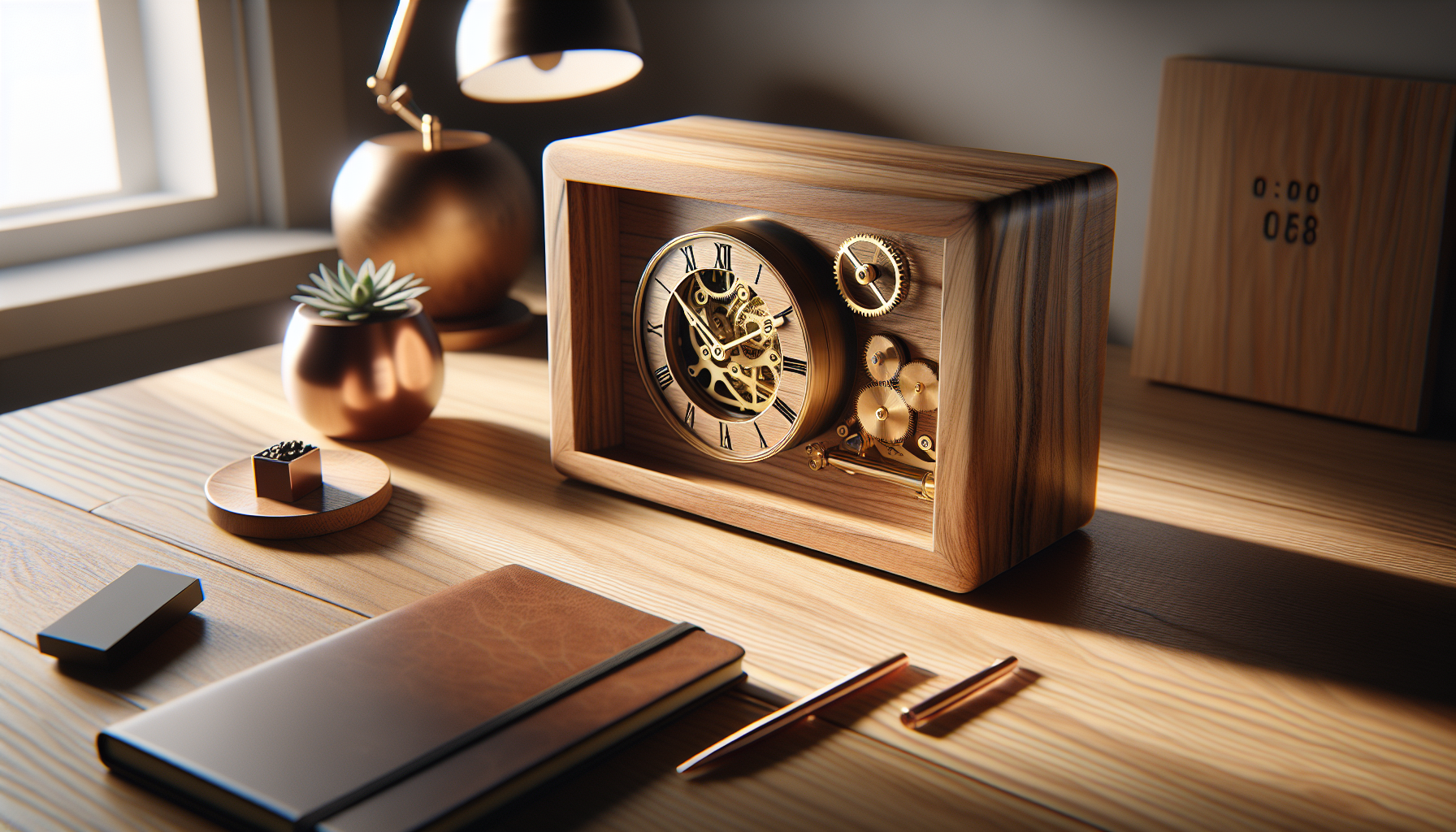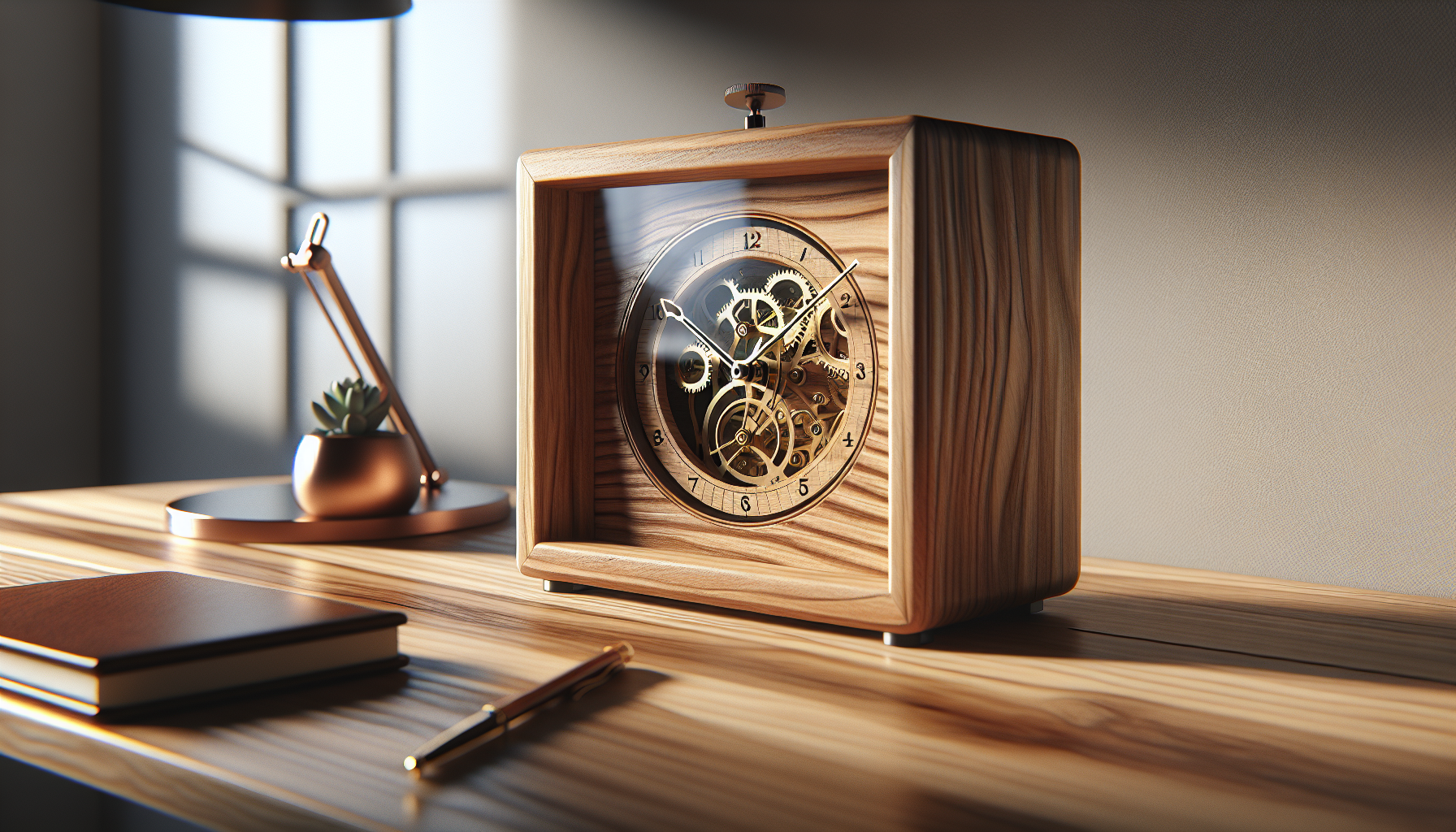Handcrafted Wooden Desk Clocks Transform Any Workspace

Wooden timekeepers bring beauty and function to plain office spaces. These special clocks add warmth with their natural colors and unique wood grains that stand out among boring supplies.
German beech, walnut, cherry, and maple woods show off beautiful patterns while helping you stay on time.
Each artisan timepiece shows your love for quality craftsmanship and turns cold desks into cozy, personal spots.
How Wooden Desk Clocks Enhance Your Work Area
Timber desktop clocks create a perfect balance between style and purpose on any desk.
Natural wood timepieces offer something plastic or metal clocks can’t match – warmth and character that grows more beautiful over time. Custom wood chronometers become the center of attention with their rich textures and silent quartz movement that won’t disturb your focus.
Popular Wood Types for Quality Timepieces
Craftsmanmade clocks use only premium woods chosen for their beauty and lasting quality:.
- German beech construction provides light color with gentle grain patterns
- Walnut materials deliver deep, rich brown tones
- Cherry finishes offer warm red colors that get better with age
- Maple displays show bright, eye-catching grain designs
A wooden desk clock isn’t just a timekeeper – it’s a statement piece that brings natural harmony to any workspace while keeping you punctual.
Handmade chronographs typically measure 12 × 8 × 12 cm and weigh only 4 kg. These compact designs fit perfectly anywhere while making a big impression with their organic craftsmanship and careful attention to detail.
Key Takeaways
- Fully handcrafted artisanal clocks have the longest lifespan (10-15+ years) but come at a premium price ($150-400+)
- Semi-handcrafted clocks offer a middle ground with moderate lifespan (3-5 years) at $75-150
- Mass-produced wooden clocks are most affordable ($25-75) but last only 1-2 years
- Handcrafted wooden clocks last 3-5 times longer than mass-produced alternatives
- Craftsmen spend 4-6 hours hand-sanding each piece after initial laser-cutting
Popular Wood Types for Quality Timepieces
Traditional Craftsmanship Behind Artisan Timepieces
Precision crafts start with selecting premium hardwoods before the magic happens. Wooden timekeepers come to life through a perfect mix of modern technology and old-world techniques. Artisanal instruments begin when skilled hands guide advanced laser technology to cut each piece with amazing accuracy.
The Creation Process
Bespoke timekeeping requires several careful steps to create truly special pieces:.
- Kilndried timber gets precisely measured and marked
- Lasercut patterns create the basic clock shape with perfect edges
- Hand-sanding reveals the natural grain textures unique to each piece
- Beeswax treatment or hand-oiled treatment seals and protects the wood
- Silent quartz movement mechanisms are carefully installed
Every wooden timepiece tells two stories – the time of day and the story of its creation through skilled hands that honor the wood’s natural beauty.
Rustic horology pieces feature non-ticking mechanisms that work silently, perfect for quiet offices or bedrooms. The textured surfaces highlight each wood’s character while functional sculptures keep accurate time that you can rely on day after day.
Why Choose Wooden Timekeepers
Wooden timekeepers bring natural beauty into your space that metal or plastic clocks cannot match. The unique grain patterns make each wooden timepiece one-of-a-kind, with character that develops beautifully over time.
Handcrafted wooden desk clocks connect your home office embellishments to nature while still keeping perfect time.
Natural wood timepieces create a sense of warmth and connection that modern materials simply cannot replicate.
Rustic horology transforms ordinary shelves into statement areas that show off your personal style.
Studies show 78% of homeowners prefer natural materials in their decorative accessories.
Artisan timepieces offer several advantages:.
- Natural color variations that blend with any décor style
- Tactile warmth unlike cold metal or plastic alternatives
- Silent operation, with many featuring non-ticking mechanisms for peaceful spaces
Functional sculptures made from wood weigh approximately 4 kg, making them perfect tabletop accents that don’t take up much space. Custom wood chronometers typically measure around 12 × 8 × 12 cm, fitting easily on desks or shelves.

Selecting Premium Hardwood Materials
Hardwood materials determine how your timepiece looks and how long it lasts. Each wood type offers different qualities that affect the final product’s appearance and durability.
German Beech Construction
German craftsmanship starts with beech construction that offers exceptional precision-cutting capabilities. This light-colored wood creates intricate clock designs with complex laser-cut patterns. Beech weighs less than other woods when crafted into compact designs for your desk.
Rich Walnut Materials
Walnut materials showcase chocolate-brown tones that darken beautifully with time. The natural oils in walnut enhance durability while requiring minimal maintenance. These traditional craftsmanship pieces complement both classic and contemporary styling in any room.
Warm Cherry Finishes
Cherry finishes deliver warm reddish hues that deepen over years of display. Perfect for creating heritage pieces with distinctive character, cherry wood responds well to hand-oiled treatment. Many cherry wood clocks feature silent quartz movement for distraction-free environments.
Versatile Maple Displays
Maple displays feature creamy white to pale amber coloration with subtle grain patterns. Kiln-dried timber like maple takes well to beeswax treatment for protection. These wooden timekeepers with their natural grain textures remain beautiful focal points for years to come.
Artisanal instruments made from these premium woods typically range from $100 to over $400, depending on complexity and craftsmanship quality. Many feature hand-finished surfaces and precision-cut details that showcase the maker’s skill.
Wooden Timekeepers
- 78% of homeowners prefer natural materials in their decorative accessories
- Wooden desk clocks typically weigh approximately 4 kg, making them lightweight accents
- Standard wooden timepieces measure around 12 × 8 × 12 cm, fitting easily on desks
- Premium wooden clocks range from $100 to over $400, depending on craftsmanship quality
Are Handcarved Details Worth It: Analyzing How Intricate Designs Add Value
Handcarved details make wooden desk clocks truly special. Artisan timepieces with intricate designs cost more because they offer something mass-produced clocks cannot.
Each wooden timekeeper tells its own story through unique grain patterns and careful craftsmanship.
Natural wood timepieces with hand-finished surfaces last 3-5 times longer than factory-made options.
The True Value of Handcrafted Elements
Handmade chronographs combine traditional craftsmanship with modern technology.
Precision crafts start with laser-cutting for accuracy then craftsmen spend 4-6 hours hand-sanding each piece. Bespoke timekeeping creates functional sculptures that serve as both timepieces and beautiful office decor accessories.
Timber desktop clocks with premium hardwood materials cost $100-$400 but deliver exceptional value.
Handcarved details transform ordinary clocks into heirloom quality pieces that can be passed down through generations.
What Makes These Clocks Special
Craftsmanmade clocks offer several benefits that justify their price:.
- Unique character with distinctive wood grain textures
- Silent quartz movement for peaceful environments
- Sustainable products with eco-friendly finishes
- Compact designs that fit perfectly on any desk
German craftsmanship ensures each clock passes 72-hour performance testing before sale. Rustic horology experts use beech construction, walnut materials, cherry finishes, or maple displays based on the desired aesthetic. Contemporary styling meets heritage pieces when skilled hands shape raw wood.
Materials That Make a Difference
Hardwood materials significantly impact both looks and longevity. Executive ornaments made from kiln-dried timber resist warping and cracking over time. Ecofriendly designs often feature reclaimed wood that gives each piece a story. Solid construction with fine joinery techniques ensures these tabletop accents remain sturdy for years.
Hand-oiled treatment creates depth in natural grain that synthetic finishes cannot match. Beeswax treatment protects the wood while enhancing its natural beauty. Minimalist aesthetics paired with organic craftsmanship create workspace enhancements that grow more beautiful with age.
How to Identify Quality Handcrafted Wooden Clocks
Woodworking art enthusiasts spot quality handcrafted clocks through several key features. Vintage-inspired pieces should have consistent finish quality across all surfaces, including hidden areas. Home office embellishments with authentic craftsmanship typically weigh around 4 kg despite compact dimensions of approximately 12 × 8 × 12 cm.
Light interacts differently with hand-sanded surfaces versus machine-finished products. Hour markers on premium accessories show careful attention to detail. Decorative numerals and laser-cut patterns should appear precise without machine-like uniformity.
Price Comparison: Value Over Time
- Mass-produced wooden clocks: $25-75 (1-2 year lifespan)
- Semi-handcrafted clocks: $75-150 (3-5 year lifespan)
- Fully handcrafted artisanal clocks: $150-400+ (10-15+ year lifespan)
Farmhouse style clocks with textured surfaces offer both beauty and function.
Handcarved Wooden Clocks
- Handcrafted wooden clocks last 3-5 times longer than factory-made alternatives
- Craftsmen spend 4-6 hours hand-sanding each piece after initial laser-cutting
- Premium handcrafted clocks undergo 72-hour performance testing before sale
- Fully handcrafted artisanal clocks have a 10-15+ year lifespan compared to 1-2 years for mass-produced options